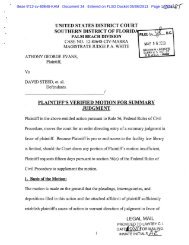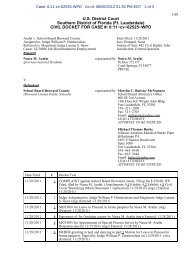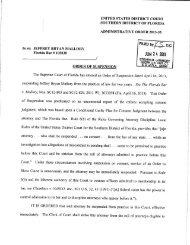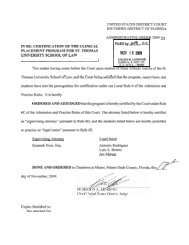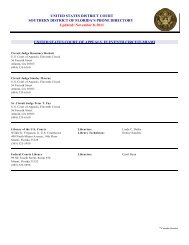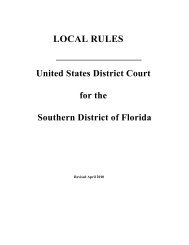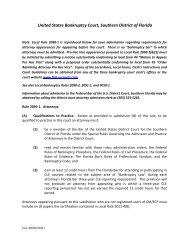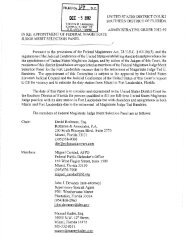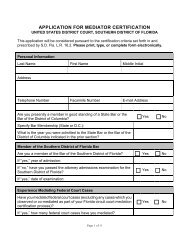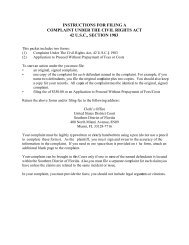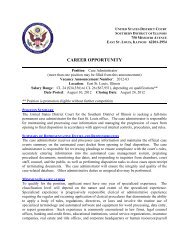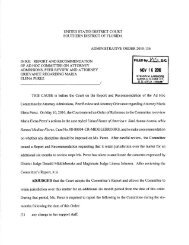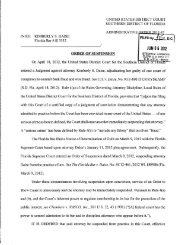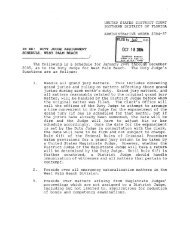JAN j 6 2010 - United States District Court
JAN j 6 2010 - United States District Court
JAN j 6 2010 - United States District Court
You also want an ePaper? Increase the reach of your titles
YUMPU automatically turns print PDFs into web optimized ePapers that Google loves.
In some circumstances, it may be appropriate for a party to answer a<br />
complex interrogatory by saying something such as "Acme Roofing Company<br />
adopts as its answer to this interrogatory the deposition testimony of<br />
Jane Smith, its President, shown on pages 127-135 of the deposition<br />
transcript." When a party has already fully answered an interrogatory<br />
question in the course of a previous deposition, the deposition may be<br />
used carefully and in good faith. However, counsel are reminded that for<br />
purposes of discovery sanctions, "an evasive or incomplete answer is to<br />
be treated as a failure to answer." See Federal Rule of Civil Procedure<br />
37(a) (3) .<br />
(9) "List All Documents." Interrogatories should be reasonably<br />
particularized. For example, an interrogatory such as "Identify each and<br />
every document upon which you rely in support of your claim in Count Two"<br />
may well be objectionably broad in an antitrust case, though it may be<br />
appropriate in a suit upon a note or under the Truth-in-Lending Act.<br />
While there is no bright-line test, common sense and good faith usually<br />
suggest whether such a question is proper.<br />
(10) Federal Rule of Civil Procedure 33(d). Federal Rule of Civil<br />
Procedure 33(d) allows a party in very limited circumstances to produce<br />
business records, including documents in lieu of answering<br />
interrogatories. To avoid abuses of Federal Rule of Civil Procedure<br />
33(d), the party wishing to respond to interrogatories in the manner<br />
contemplated by Federal Rule of Civil Procedure 33(d) should observe the<br />
following practice:<br />
1. Specify the business records and materials to be produced in<br />
sufficient detail to permit the interrogating party to locate and<br />
identify the records and to ascertain the answer as readily as could the<br />
party from whom discovery is sought.<br />
2. Make its records available in a reasonable manner (i.e., with tables,<br />
chairs, lighting, air conditioning or heat if possible, and the like)<br />
during normal business hours, or, in lieu of agreement on that, from 9:00<br />
a.m. to 5:00 p.m., Monday through Friday.<br />
3. Make available any electronically stored information or summaries<br />
thereof which it has.<br />
4. Provide any relevant compilations, abstracts or summaries either in<br />
its custody or reasonably obtainable by it, not prepared in anticipation<br />
of litigation. If it has any documents or electronically stored<br />
information even arguably subject to this clause but which it declines to<br />
produce for some reason, it shall call the circumstances to the attention<br />
of the parties who may move to compel.<br />
5. All of the actual clerical data extraction work should be done by the<br />
interrogating party unless agreed to the contrary, or unless, after<br />
actually beginning the effort, it appears that the task could be<br />
performed more efficiently by the producing party. In that event, the<br />
interrogating party may ask the <strong>Court</strong> to review the propriety of Federal<br />
Rule of Civil Procedure 33(d) election. In other words, it behooves the<br />
producing party to make the search as simple as possible, or the<br />
98



